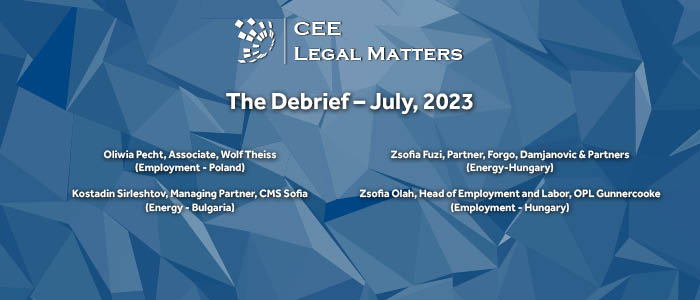In The Debrief, our Practice Leaders across CEE share updates on recent and upcoming legislation, consider the impact of recent court decisions, showcase landmark projects, and stay up to date with the latest developments impacting their respective practice areas.
This House – Implemented Legislation
Labor law witnessed a period of heightened activity in Poland during the past two months, as new legislation was implemented. “In May, several regulations came into force regulating issues related to the recent amendment of the Labor Code,” Wolf Theiss Associate Oliwia Pecht says. “Among others, the regulation of the Minister of Family and Social Policy amending the regulation on employee documentation came into force. The regulation extends the catalog of documents that an employer is obliged to collect in an employee’s personnel file. New documents that will have to be recorded on file will include requests for the employment contract to be changed to an indefinite contract.” In addition, according to Pecht, the scope of the employment certificate given to the employee is changing and “will now have to take into account, among other things, the days when the employee used the new type of force majeure leave for urgent family matters caused by illness or accident.”
This House – Reached an Accord
In Hungary, notable legislative updates occurred in employment and energy. “The Hungarian Parliament adopted the implementation of the Whistleblowing Directive: Act XXV of 2023 on complaints, disclosures in the public interest, and related rules on reporting abuses,” OPL gunnercooke Head of Employment and Labor Zsofia Olah states. “Entities with at least 250 employees have to be compliant with the law before July 24, 2023, while smaller businesses have time until December 17, 2023.”
Additionally, according to Forgo, Damjanovic & Partners Partner Zsofia Fuzi, “the Hungarian Government is introducing a price cap on electricity in certain economic sectors from July 1, 2023. The Hungarian government has adopted Government Decree No. 238/2023 (VI. 19.), which amends the fixed price in the already existing electricity purchase contracts and determines a price cap on electricity,” Fuzi explains. “The price cap is EUR 200/megawatt, and it will be effective from July 1, 2023, until December 31, 2023. The cap only applies to entities that carry out their main activity in manufacturing, accommodation and warehousing, and support activities for transportation.” According to her, it is expected that the new measure will impact more than 5,000 companies. “In exchange, the government expects the supported companies to increase their production capacity and not raise prices this year,” Fuzi notes. “The electricity trader companies that are obliged to apply the price cap in their existing contracts will be compensated, but the detailed rules of such compensation are yet to be introduced.”
In terms of recently signed legislation in Poland, Pecht says that “on May 29, 2023, the President of the Republic of Poland signed a law that extends the dates of legal residence until March 4, 2024, for Ukrainian citizens who have arrived in Poland due to acts of war.” She continues: “Separately, the dates of legal residence of Ukrainian citizens who are still studying in schools have been extended.”
This House – Under Review
CMS Sofia Managing Partner Kostadin Sirleshtov highlights that Bulgaria’s energy sector developments have been very dynamic recently, evidenced by the recent renewable energy regulations drafts. “At the end of May, the Parliament adopted at first reading the draft act for amendment of the Renewable Energy Act,” he says. “The draft act (i) simplifies the grid-connection procedures by introducing a universal grid connection agreement for greenfield renewable projects (replacing the current system of preliminary and final grid connection agreements); (ii) introduces temporary grid connections in the case of a lack of availability or partial availability of a grid connection, whereby the grid operator is obliged to invest into its grid in parallel with the investment of the producer; (iii) takes an important step towards securing a grid connection by means of migration to capacity reservation tenders on annual basis for grid connection of future greenfield projects and abolishes of the current first come – first serve procedure for grid connection capacity reservation.”
Sirleshtov emphasizes that “the draft act aims to regulate grid connection costs where the latter shall be covered either by an advance payment or by bank guarantee as agreed between the grid operator and the producer. Furthermore, certain amendments to the draft act are expected to be proposed before the first and second readings in parliament to enhance the development of floating photovoltaics and agrivoltaics.”
This House – The Latest Draft
In Poland, “in May, work started on a draft regulation amending the regulation on health and safety at work at workplaces equipped with screen monitors,” Pecht says. “According to the planned changes, employers will be obliged, among other things, to provide employees working with laptops for more than half of their daily working time with a mouse, keyboard, monitor, or laptop stand. The regulations are intended to adapt health and safety rules to the current technology used in workplaces.”
Done Deals
Sirleshtov highlights several noteworthy transactions in Bulgaria. “In terms of energy, we saw several transactions,” he says. “Astronergy/Chint (Korea/China) successfully acquired the Boychinovtsi 60-megawatt photovoltaic project with an estimated investment cost of EUR 50 million – the first new addition to its Bulgarian solar portfolio since 2012. Furthermore, the Finnish renewables investor Taaleri Energia made its Bulgaria debut by taking over the Gorichane & Prolez 80-megawatt greenfield wind project near Shabla with estimated investments of around EUR 120 million.”
In Broader Related News
“The European Parliament and the Council adopted new rules on pay transparency on April 24, 2023, to strengthen the application of the principle of equal pay for equal work or work of equal value between men and women through pay transparency and enforcement mechanisms,” Olah reports. “Employers have time to prepare: the Directive will take effect twenty days after its publication in the Official Journal of the EU (likely this year), after which EU member states will have three years to implement it into domestic law. Employers with 150+ workers will need to report the pay gap information within one year, and employers with 100 to 149 workers within five years after the date of implementation.”
Thank you to our Practice Leader contributors for this issue:
- Oliwia Pecht, Associate, Wolf Theiss
- Kostadin Sirleshtov, Managing Partner, CMS Sofia
- Zsofia Fuzi, Partner, Forgo, Damjanovic & Partners
- Zsofia Olah, Head of Employment and Labor, OPL gunnercooke
















